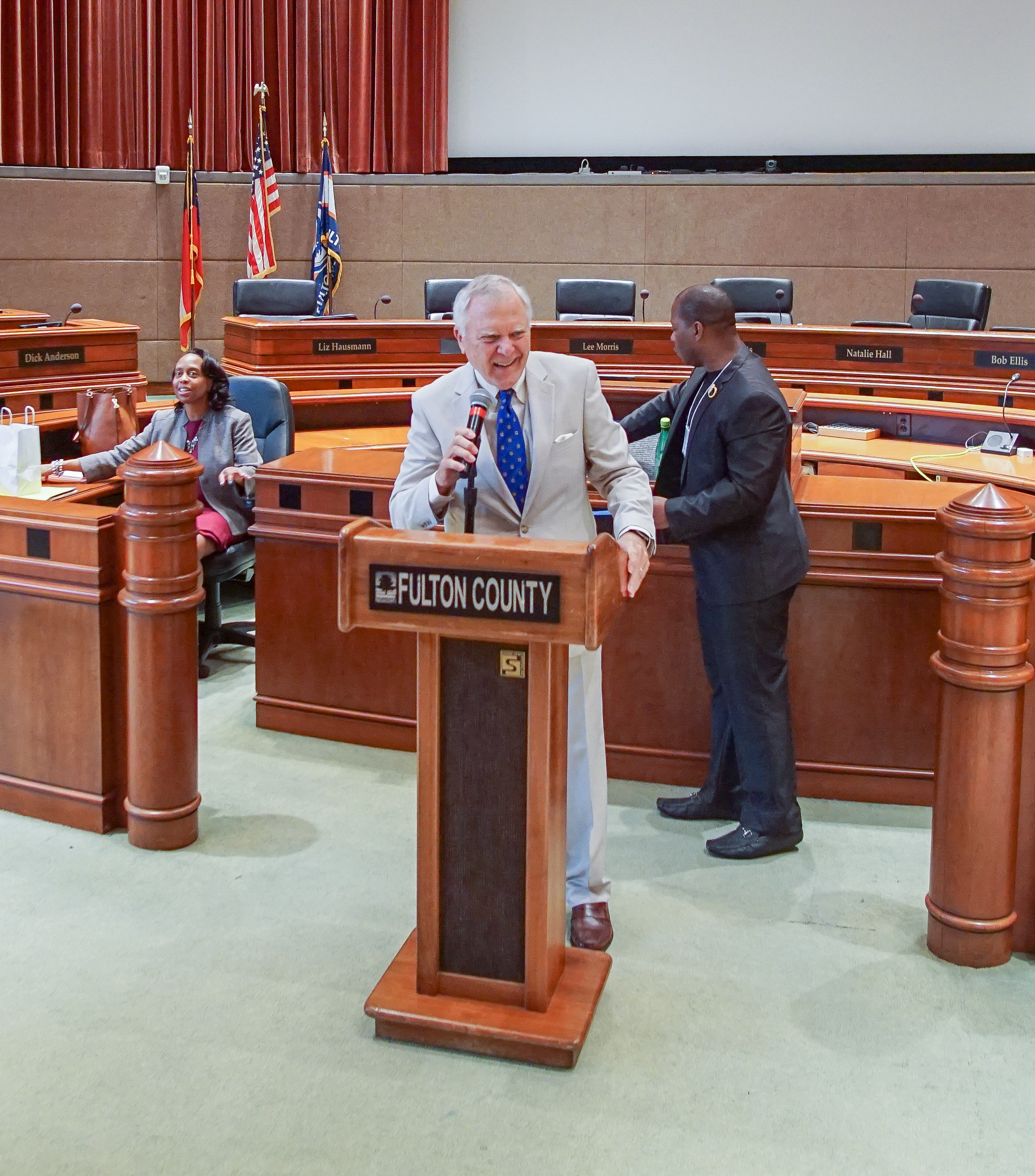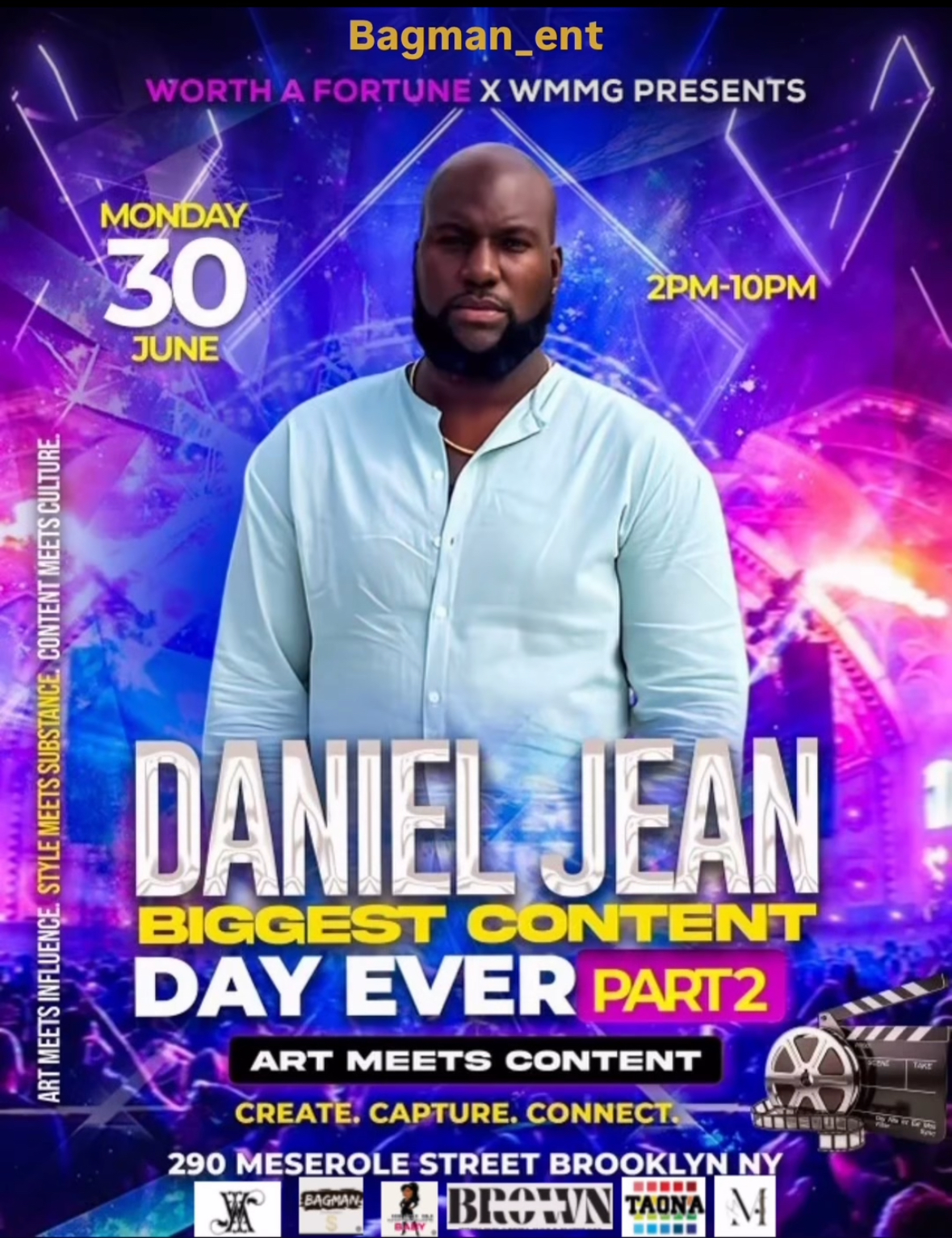We Speak Events
The Calloway Criminal Justice Reform Summit; An Insightful, Thoughtful and Powerful Conversation towards Equality in Justice Reform

A wholistic, Bi-partisan Summit on Criminal Justice Reform in Georgia was held at the Fulton County Government Center in Atlanta, Georgia on Saturday, September 7, 2019 hosted by the DEAL Project. Early arrivals were greeted and treated to unlimited Starbucks coffee and hot Krispy Kreme donuts as they awaited the conversation on the progress of criminal reform in Georgia. As attendees were scanned in, one by one, and registrars, Yul and Brenda Smith Anderson, confirmed those who had registered and checked in others, Fulton County SWAT Team stood carefully over and stood watch from floors above adding intensity to the atmosphere as district attorneys, judges, and other dignitaries arriving, such as former Georgia Governor Nathan Deal.

“Criminal Justice Reform in Georgia is desperately needed to address age-old social issues that are rooted in bigotry, racism, classism, and, believe it or not, uninformed and uneducated theology,” says Ambrose B King Jr who is organized the Summit and founded the D.E.A.L Project (Acronym for Distributing and Empowering Georgia Citizens’ Access to Legal Literacy) and named in honor of Georgia’s 82nd Governor. John Nathan Deal, Esq, who made it a personal mission to overhaul Georgia’s mass incarceration, probation, and Criminal Justice problem(s). King, influenced by Michelle Alexander’s book The New Jim Crow while a student at Morehouse College, claims, “There has been a serious shift in Criminal Justice reform in Georgia and a lot of southern states who used the criminal justice system as a weapon of mass destruction against one group of people, it minorities. A criminal record, in most cases, limits one from ascending to a different tax bracket and keeps one from obtaining homes, jobs, and class that the majority enjoys — with or without a criminal background. We know that white men, having did time for white color crimes, can get out of prison and still get a well paying job from their friends.” King, who is a native of Tifton, Georgia and Atlanta socialite and activist, continued, “It was reported, in the Atlanta Journal Constitution, that if nothing changed in Georgia that two new prisons would’ve had to be built during Governor Deal’s tenure — costing the tax payers $264 million dollars…..because 1 in 13 of its citizens were on probation , locked up, or in prison.

Moreover, we have law libraries in prison but do not have law libraries or access to civil attorneys to help with civil proceedings, statewide. Yet, I’m from a rural Georgia town and rural Georgia have 0% access. Thus, I created the DEAL Project to join the fight to gain access.”
The attendees gathered in Fulton County Government Center’s Legislative Assembly hall to listen to expert panelists who gave an informative and inspiring conversation. King opened up with a welcome and introduced members of the Calloway Family. Reverend Benjamin Callloway, father of the late Rev. Dr. Terrance Calloway for whom the Summit is named, gave the opening prayer, followed by an introduction of Panel Facilitator, Judge Cassandra Kirk, Chief Judge of Fulton County’s Magistrate Courts. Panelists included: Shermela J. WilliamsLitigator, Thompson, Kennedy, Sampson, Tompkins Law Firm, Clinton Rucker, Chief Asst. District Attorney, Fulton County, Joyette Holmes, District Attorney for Cobb County, Sherry Boston, District Attorney for Dekalb County, Kosha S. Tucker Staff Attorney for theAmerican Civil Liberties Union of Georgia (ACLU), Dar’shun Kendrick Attorney and State Representative’s Minority Caucus Chief Deputy Whip, Laura Hogue Attorney and President of the Georgia Association of Criminal Defense Lawyers, Erin H. Gerstenzang, Atlanta Civil and Criminal Defense Attorney,Marissa McCall Dodson, Attorney and Public Policy Director, Southern Center for Human Rights, A’Sheika L. Penn, Deputy Chief Assistant District Attorney DeKalb County District Juvenile Court Division, Steven Teske,Chief judge of the Juvenile Court of Clayton County, Eric S. Fisher, Partner Taylor-English’s Litigation and Dispute Resolution Department, L. Christopher Stewart, Civil and Rights and Criminal Defense Attorney with Stewart Trial Lawyers LLC, Rev. Justin E. Giboney, Civil Rights Attorney, Minister, and Founder of &(AND) Campaign, Ashleigh B. Merchant, Esq Criminal Defense Attorney and Partner for the Merchant Firm, Rebeca E. Salmon, managing partner, A Salmon Firm, LLC and President of the Access to Law Foundation, Cheferre “Che” Young,Asst. District Attorney, Juvenile Divison Macon Judicial Circuit, Cheryl Payton,CCH/Identification Program Manager, Georgia Bureau of Investigation, and Tracy Rolle, the Founder of AIME, LLC ,Inspiring Our Youth Corp. and Author on Recidivism and Rehabilitation.

As the panel discussion was underway, flanked by Fulton County PD and assistants, arrives Governor Deal who sits and listen the panel and was later acknowledged by Judge Teske, Sherry Boston, and Judge Kirk in their discussion. After the each the panelist’s final remarks, King introduced Deal and asked him to share words. Gov. Deal tell the audience that we must reform education. “Most of our juvenile and adults in prison now don’t have a high school diploma. We sought to change this and invited in Technical Colleges and other Secondary education institutions to allow prisoners to further their education through correspondence and hands-on courses and curriculum.”
Also featured were an area of Community Resources made up of nonprofit and civic organizations designed to assist the formerly incarcerated, family members of the incarcerated, work-ready programs, programs that assist in housing, and access to justice programs to help low income and the legal illiterate navigate court proceedings and documentation. Attendees were also were, free of charge, their full background check and explanations on how some things could either be restricted fixed if corrections were needed to be made, by the CCH/Identification Program, Georgia Bureau of Investigation.
Sponsors for the Summit were Attorney Brian Poe and Associates, Attorney Alis Hughes, Rev. Fer-Rell Malone and the Macedonia Baptist Church of Waycross, GA, Mrs. Marsha Cummings Calloway, Rev. and Mrs. Benjamin Calloway, Krispy Kreme, Starbucks, Fulton County Commissioner Marvin Arrington, Jr. Esq, Atlanta City Council members Antonio Brown, Andrea Boone, Michael J. Bond, and Cleta Winslow.
For future events by the DEAL Project and if you’d like to be notified about them or join their team email thedealprojectgeorgia@gmail.com
We Speak Entertainment
BIGGER AND BETTER: DANIEL JEAN CONTENT DAY PART 2

NEW YORK-NY— On June 30th, Daniel Jean, one of New York City’s top influencers, is hosting the second installment of #ContentDayNYC event. Jean is bringing the city’s hottest rappers, dancers, and influencers from the five boroughs under one roof.
Jean’s first content day, popped off on May 19th, 2025 as he packed out three floors of the Culture House store in the Herald Square section of Manhattan. In attendance were rappers Stunna Dior, Kyah Baby, Lucky Banks. Media Platforms World Star and CEO of Still got the Juice TV, Phresher Dyggs, Lite Feet dancer Xavian Sanchez, and Influencers Dupree Christopher and Devonte Rosero. Hot 97’s DJ Drewski made an entrance, when he walked in with a bird in his backpack.
Guest were able to get their teeth bejeweled and lymphatic massages to help with slimming up for summer all while showing off their talents, personalities and bodacious bods. The event, created to curate original and fresh content while cross promoting one another, provided a perfect networking and community building opportunity.
“I sat with my team and was trying to figure out what can we do to connect everyone together and while ideas started to flow , we said let’s do a content day. And there you have it, Daniel Jean presents The Biggest Content Day Ever.” said Jean.
Captured by: @_projecthenny #ContentDAyNYC #CreateCaptureConnect
If you’re a millennial or active on social media, then you may have seen the influencer Daniel Jean on your timeline in one of his many viral videos. Along side commuters, Daniel and his wife Esmerlin Valdez, stormed the already crowded train system with decorations a host of creators and cameras rolling capturing the most viral wedding reception in NYC metro history. In between recording his skits, he serves as a private chef at The Luxe Hideout, one of New York City’s hottest venues. Jean is also a philanthropist, in 2024 serving dinner to those same train riders.
For years Daniel has been developing organic relationships while aligning himself with the city’s local businesses, celebutants, artists, influencers and content creators.
Jean is partnering with Worth A Fortune, Biopic Arts Collective and Warrior Mentality Music Group to bring curated sets, professional photography and videography operations, live direction and more.
The Biggest Content Day Ever part-two is promising to be bigger and better with more activations, photo opportunities, and few special guests appearances. The first 100 tickets have sold out. With eight hours of playtime, you never know who may pull up, so don’t you miss out and get your tickets right now on eventbrite.com .

-

 We Speak Soccer7 days ago
We Speak Soccer7 days agoNo Entry Allowed: How Austin Fortner Is Becoming a Standout Keeper with Confidence and Control
-

 We Speak Football1 week ago
We Speak Football1 week agoFrom Snap to Touchdown: How Niah Reyes Plays the Game with Heart and Hustle
-

 We Speak Coaches1 week ago
We Speak Coaches1 week agoCoach of Culture, Heart of a Movement: The Extraordinary Journey of Daniel Moore, Pioneer of Women’s Flag Football and Builder of Young Lives
-

 We Speak Soccer2 days ago
We Speak Soccer2 days agoFrom Small Steps to Big Goals: How Alianna-Reyne Basa Became a Fearless Striker with a Champion’s Heart







